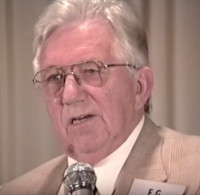20th century British professor of economics

Edwin George West (27 February 1922 – 6 October 2001) was an economist and economic historian at Carleton University interested in the relationship between the state and the education sector. He applied public choice theory to state education and "he had a profound influence on both academic scholarship and education policy in Britain and abroad". The E.G. West Centre at Newcastle University is named in his honor.
Born
Articles
The Education Debate We're Not Having, by Scott McPherson, FFF.org, 15 Nov 2006
Discusses a New Hampshire supreme court decision about public school funding and points out historical and liberty-minded solutions
Discusses a New Hampshire supreme court decision about public school funding and points out historical and liberty-minded solutions
While the state, to some extent, has always had its fingers in education, its role was initially minimal. Prior to the wholesale takeover of education by government, parents typically paid about half their kids' tuitions directly, while the other half was made up in local taxes. Education was mostly a private enterprise. The tireless research of historian E.G. West shows that the earliest movements at the state level to increase education funding were meant to address only the perceived need of those living far from city and village life in small pockets of rural poverty.
Related Topics: Compulsory education, New Hampshire
To Homeschool or Not to Homeschool: How Both Sides Got it Wrong, Part 2, by Scott McPherson, FFF.org, 24 Sep 2003
Continues the discussion of the debate in USA Today (3 Sep 2003) between supposedly opposing sides of homeschooling, now examining the position of the writer against homeschooling
Continues the discussion of the debate in USA Today (3 Sep 2003) between supposedly opposing sides of homeschooling, now examining the position of the writer against homeschooling
A home-schooled child is independent, free-thinking, questioning, and hostile to artificial constraints—exactly the kind of person who might one day begin to question the need for what education historian E.G. West called "a growing educationist bureaucracy and a protection-seeking teaching profession." ... [I]t's interesting to note that before the introduction of compulsory education laws in the United Kingdom (according to E.G. West), "there was a near-universal system of private fee-paying schools, and the majority of parents were using it."
Related Topics: Educational freedom, Homeschooling
Interviews
Interview with Adam Smith [via Edwin West], The Region, Jun 1994
Professor Edwin G. West stands in for Adam Smith and answers questions from the Federal Reserve Bank of Minneapolis banking and policy issues magazine, The Region
Professor Edwin G. West stands in for Adam Smith and answers questions from the Federal Reserve Bank of Minneapolis banking and policy issues magazine, The Region
Each issue of The Region has carried an interview with a leader from within the Federal Reserve or with someone whose work or ideas have been of interest to our policymakers. In planning this issue, we decided that Adam Smith, who many consider the father of modern economics, would make a perfect interview ...
Professor West, who received his doctorate in economics from London University, will have two special American editions of earlier works published in the near future by the Liberty Fund: Education and the State (1970) and Education and the Industrial Revolution (1975).
Professor West, who received his doctorate in economics from London University, will have two special American editions of earlier works published in the near future by the Liberty Fund: Education and the State (1970) and Education and the Industrial Revolution (1975).
Related Topics: Banking, Central Banking, Economic Freedom, Educational freedom, Hong Kong, India, Japan, John Stuart Mill, Minimum Wage Laws, Russia, Adam Smith, Taxation
The introductory paragraph uses material from the Wikipedia article "E. G. West" as of 3 Apr 2018, which is released under the Creative Commons Attribution-Share-Alike License 3.0.
